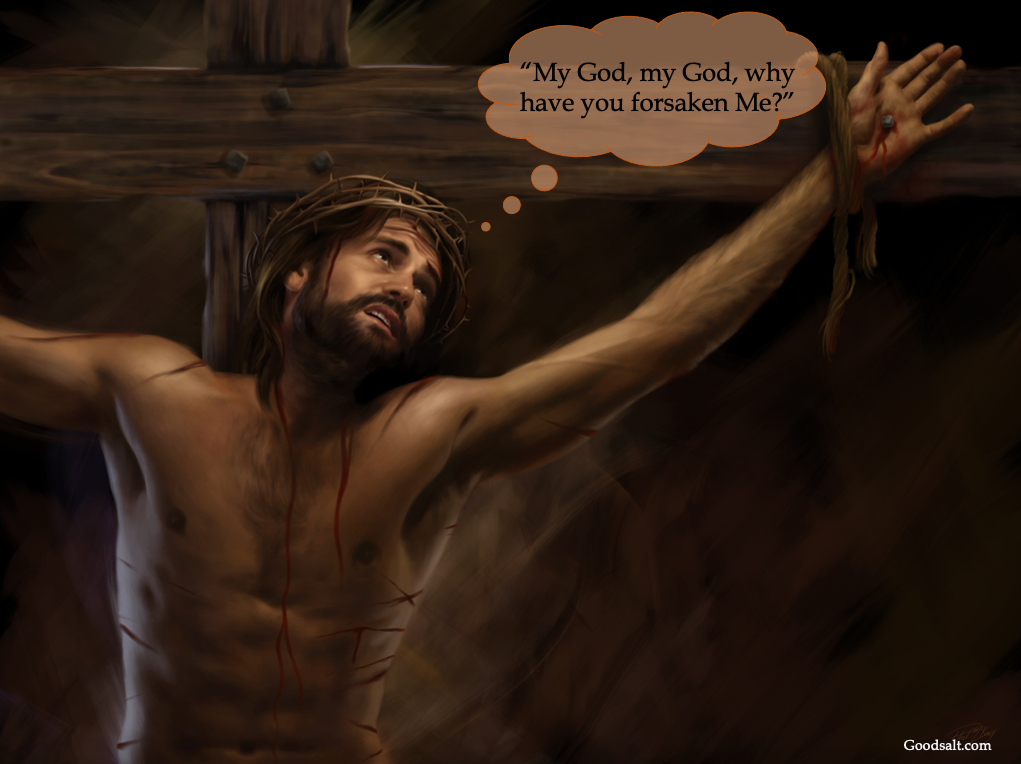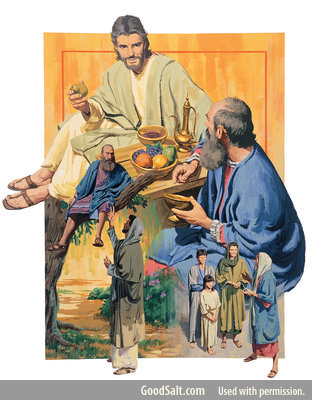“And this is the testimony: that God has given us eternal life, and this life is in His Son.” I John 5:11
Assurance of salvation is very dear to the heart of God. He wants His children to be absolutely certain that they have eternal life the moment they believe His testimony about His Son, Jesus Christ.
Imagine a child doubting that he or she was truly their parents’ son or daughter based on their behavior!?! Think of the insecurities and fear that child would have. Instead of drawing near to his or her parents when struggling with sin or shame, he or she would hide their struggles and try harder and harder to overcome them, only to experience more defeat, fear, and shame. This is a terrible cycle of shame that God never intended His children to endure. Yet Christians are being taught this at many different levels within evangelical Christianity today.
Christians are also being told that assurance of salvation keeps believers from living holy lives. In other words, if I can know I have everlasting life which can never be lost, then what is to keep me from living like the Devil the rest of my life? Doesn’t assurance of salvation give me a license to sin? The apostle John would say, “No! A thousand times, No!”
Knowing we have eternal life is based on the testimony of God, not the testimony of men. Yet various human teachers throughout church history have undermined assurance of salvation by saying it is based both on the objective promises of God and on the subjective evidence of the professing believer’s works. 1 In essence they are teaching that believing in the promises of God is not enough. There must be faith plus fruit. One popular Bible commentator seems to base our assurance of salvation on the subjective evidence of holiness or purity:
“Those who cling to the promise of eternal life but care nothing for Christ’s holiness have nothing to be assured of. Such people do not really believe. Either their professed ‘faith’ in Christ is an utter sham, or they are simply deluded. If they did truly have their hope fixed on Christ, they would purify themselves, just as He is pure (3:3).” 2
As mentioned previously, there are two primary areas where the enemies of Christ or antichrists have attacked the body of Christ: God’s Work (I John 5:6-9) and God’s Word (I John 5:10-13). Through Christ’s baptism (“the water”) and His sacrificial death on the cross (“the blood”),God’s “Spirit” bore witness to the identity and work of God’s Son, Jesus Christ (5:6-8). This “witness of God” concerning “His Son” is far “greater” than “the witness of men” (5:9).
Before stating what God’s witness of His Son is, John draws a contrast between believing and not believing the testimony of God concerning His Son: “He who believes in the Son of God has the witness in himself; he who does not believe God has made Him a liar, because he has not believed the testimony that God has given of His Son.” (I John 5:10). The phrase “believes in” (pisteueō eis) is commonly used in John’s gospel (cf. John 1:12, 2:11, 23; 3:15-16, 18, 36) and is identical in meaning to “believes that” (pisteueō hoti) (cf. John 11:27; 20:31; cf. 8:24; 13:19). Both Greek constructions express the means of receiving eternal life (cf. John 20:30-31 with John 3:15-16, 18, etc. and cf. 1 John 5:1). 3
Dr. Charlie Bing states that “after noting every use of pisteuō in the gospel of John (pisteuō eis with accusative – John 1:12; 2:11, 23; 3:15,16, 18a, 18c, 36; 4:39; 6:29, 35, 40, 47; 7:5, 31, 38, 39, 48; 8:30; 9:35, 36; 10:42; 11:25, 26a, 45,48; 12:11, 36, 37, 42,44 [twice], 46; 14:12; 16:9; 17:20), pisteuō with dative – John 2:22; 4:21, 50; 5:24, 38, 46 [twice], 47 [twice]; 6:30; 8:31, 45, 46; 10:37, 38 [twice]; 12:38; 14:11a), pisteuō hoti – John 4:21; 6:69; 8:24; 11:27, 42; 13:19; 14:10; 11a; 16:27, 30; 17:8, 21; 20:31a, pisteuō absolutely – John 1:7, 50; 3:12 [twice], 15, 18b 4:41, 42, 48, 53; 5:44; 6:36,47, 64 [twice]; 9:38; 10:25, 26; 11:15, 40; 12:39; 14:11b, 29; 16:31; 19:35; 20:8, 25, 29 [twice], 31b), pisteuō with neuter accusative (John 11:26b), Schnackenburg concludes, ‘In many texts, pisteuō eis is on the same footing as a hoti-clause…’ and ‘Often the absolute pisteuein means the Johannine faith in the fullest sense…’ Thus one should not so easily delete the soteriological significance of pisteuō plus hoti – in John. This is the construction found in clear salvation verses like John 8:24, ‘believe that I am He,’ and 20:31, ‘believe that Jesus is the Christ’. Likewise, pisteuō plus the dative without a preposition is used in a clear salvation verse, John 5:24, “believes him who sent me” (NIV).’” 4
The Biblical evidence shows that to“believe in” and to “believe that” are used interchangeably by the apostle John in his gospel for saving faith. John would not contradict in I John would he had already written in his gospel.
John notes that when a person “believes in the Son of God,” he has “the witness in himself” (I John 5:10a). When an individual believes in Jesus for eternal life, God’s witness about His Son becomes real to him or her. God’s Spirit gives them the assurance that they were right to believe in Christ for eternal life. However, if a person “does not believe … the testimony that God has given of His Son,” he or she is calling God “a liar” (5:10b).
“The writer, then, cannot allow that one can profess belief in God, as did his opponents, and yet reject God’s testimony to His own Son. Such rejection cannot be excused on the basis of ignorance. The evidence is too clear and too weighty. Rather, it is deliberate unbelief, the character of which in the end impugns the very being and character of God. If Jesus is not God’s own Son in the flesh, then God is no longer the truth. He is the liar.” 5
For John, there is no middle ground. “There is nothing here about ‘head or heart belief,’ or about a ‘faith that yields to God as over against mere intellectual assent,’ etc. The Bible does not complicate faith like that. Once we have understood the message, the issue is: Is it true or false? Do we believe it, or do we not?” 6
Nowhere in the Bible does God distinguish head belief from heart belief. All belief is belief. A person either “believes in the Son of God” or he “does not believe…” (5:10). If we believe in Christ for eternal life, then we know we have eternal life because Jesus guarantees, “He who believes in Me has everlasting life” (John 6:47). To doubt that we “truly believe” is to disbelieve Jesus’ promise. Either I believe Christ’s promise, or I do not. If I do, I have eternal life. If I do not, I stand condemned as one who “has not believed in the name of the only begotten Son of God” (John 3:18). The book of I John and the gospel of John do not condition eternal life on whether one has “heart belief” instead of “head belief.”
Having drawn a contrast between believing and not believing the testimony God has given about His Son (5:10), John now states the content of God’s testimony: “11 And this is the testimony: that God has given us eternal life, and this life is in His Son. 12 He who has the Son has life; he who does not have the Son of God does not have life.” (I John 5:11-12). The phrase “And this is the testimony of God” refers to verses 11 and 12 which taken together state “the testimony of God” about “His Son.” Verse 11 states what God has bestowed and verse 12 states the exclusive character of this bestowal. 7
According to this divine testimony, “God has given us eternal life” (5:11a). Eternal life is a gift from God, and it is inseparable from the Person of “His Son.” Salvation is not giving God your life as so many Christians invite non-Christians to do. It is God giving us His “eternal life.”
In John’s gospel Jesus defined eternal life: “And this is eternal life, that they may know You, the only true God, and Jesus Christ whom You have sent.” (John 17:3). The word “know” (ginōskō) refers to an intimate or experiencial knowledge of God, not just an awareness of certain facts. 8 Notice that the primary focus is on one’s relationship with God (“life”),not the duration (“eternal”).This is not just a future promise, it is a present reality for all believers in Jesus. Eternal life is knowing the true God personally in one’s experience forever.
This knowledge of God begins the moment we believe in Jesus for His gift of eternal life. “But that’s only the beginning. You must grow in your knowledge and understanding, as sure as an infant must progress toward childhood. God wants us to grow in our knowledge of Him—He wants us to deepen in our experience of eternal life. To do that, you must have intimacy with His Son, because” 9 ”this life is in His Son” (I John 5:11b).
Eternal “life is in His Son” (5:11b), since Jesus is “eternal life” (I John 5:20). Hence, eternal “life” and God’s “Son” are one gift together given from God. 10 Therefore, “He who has the Son has life; he who does not have the Son of God does not have life.” (5:12). There is no one or nothing else where this “life” can be found. It is not found in a church or in a pastor. Neither is it found in a lifestyle or an act of obedience.
The antichrists or false teachers seem to have questioned John’s readers’ belief that they possessed eternal life (cf. 2:25). And since the antichrists also denied that Jesus is the Christ (cf. 2:22), they would have affirmed that there was no eternal life available in Jesus. Thus, in the eyes of these false teachers, John’s readers did not really have eternal life. 11
The apostle John counters this false teaching by asserting that he and his readers do have eternal life because God has given it to them in His Son and that this life is to be found in Him and nowhere else. 12
“Since this eternal life is in His Son, it follows that if a person has the Son, he also has life (eternal life); and if a person does not have the Son, he does not have life.” (5:12). 13 What must a person do to “have the Son” (5:12)?
The only requirement to “have the Son” in I John or the entire New Testament for that matter is to believe. The apostle writes, “These things I have written to you who believe in the name of the Son of God, that you may know that you have eternal life, and that you may continue to believe in the name of the Son of God.” (I John 5:13). What must a person do to “know” (not guess, hope, or think) he or she “have eternal life”? “Believe in the name of the Son of God.” There is no mention of having fruit, obedience, or a changed life to know one has eternal life. The only condition is to “believe in the name of the Son of God.” This is so simple that many adults miss it.
“Assurance is part of the essence of saving faith. If eternal life can be lost, it can’t be eternal. God wants you to know that you have eternal life—not based on your fluctuating faith—but based on the object of your faith, Jesus.” 14
“Every believer knows at the point of saving faith that he has eternal life, because the promises he believes guarantee it (cf. John 11:25-26). But the believer is not immune to doubts after he is saved (cf. John the Baptist; Luke 7:18-19). The antidote to such doubts is always God’s promises. These promises can be referred to repeatedly as a fresh source of assurance. No book of the Bible contains more of these straight-forward guarantees than John’s Gospel itself (John 3:16, 18, 36; 5:24; 6:35-40, 47; etc.). First John 5:11-12 reminds the readers of God’s testimony they have already believed.
“Since the believers he writes to have believed in the name of the Son of God (whose identity is attested by ‘the Spirit, the water, and the blood,’ v. 8), then they should rest securely on the testimony that God has given about and through His Son. This testimony assures believers that they do have eternal life.
“All true assurance of salvation and eternal life must rest on the ‘testimony of God,’ for only that testimony has full reliability. Ironically once one’s Christian experience is made the grounds for assurance, John’s statement in v 13 about knowing becomes a complete impossibility!
“The apostle here seeks to reaffirm the assurance of his readers which was to question the antichrists.” 15
What about the phrase “these thing?” Doesn’t that refer to the entire book of I John? Some will argue that I John 5:13 is the purpose statement for John’s epistle since the apostle’s purpose statement in his gospel was near the end of the gospel of John (John 20:31).They conclude that I John was written to provide tests for professing believers in Jesus so they could know for sure they have eternal life. According to this view, one not only needs to believe in the name of the Son of God to know they have eternal life, but they must also walk in the light (1:7), confess their sins (1:9), keep God’s commandments (2:3-5; 3:24), abide in Christ (2:6, 24, 27-28), love one another (2:9-11; 3:11-23; 4:7-5:3), hate the world (2:15-17), acknowledge Jesus is God’s Son (2:23; 4:2-3, 4:15), practice righteousness (2:29-3:10), listen to and obey apostolic teaching (2:18-19; 4:6), and avoid idolatry (5:21). 16
But this view fails to understand that “there are five purpose statements in I John (1:3, 4; 2:1, 26; 5:13) plus ten imperatives (2:15, 24, 27, 28; 3:1, 7, 13; 4:1 [twice]; 5:21), any of which could possibly provide John’s purpose for writing.” 17 First John 1:3-4 provides the most comprehensive primary and secondary purposes in writing this epistle. 18
Hodges notes that the words, “These things” in I John 5:13 do not refer to the entire book of I John, but to the verses immediately preceding it (5:6-12), observing that this near reference is consistent with John’s style throughout his epistle: 19
- The statement “these things we write to you” (1:4) refers to what was just stated in verses 1:1-3.
- The words, “these things I write to you, so that you may not sin” (2:1) refer to the teaching on sin in 1:5-10.
- The statement, “These things I have written to you concerning those who try to deceive you” (2:26) refers to the preceding discussion about antichrists (2:18-25).
In 1 John 5:13 the “these things” points to “the testimony” or “witness” (martyria, the noun, or martyrēo, the verb) which has been mentioned seven times in 1 John 5:9-12: 20
“9 If we receive the witness of men, the witness of God is greater; for this is the witness of God which He has testified of His Son. 10 He who believes in the Son of God has the witness in himself; he who does not believe God has made Him a liar, because he has not believed the testimony that God has given of His Son. 11 And this is the testimony: that God has given us eternal life, and this life is in His Son. 12 He who has the Son has life; he who does not have the Son of God does not have life.” (emphasis added)
“What John is arguing for in this passage is the credibility of God’s testimony (witness). It is greater than that of men. And this witness or testimony is that God has given us eternal life, and this life is in His Son. We can either accept or reject this testimony.
“Notice that we are not called upon to search our faith to see if it is real. We do not have to have faith in our faith.’ We are called upon to have faith in what God says about His Son. Our assurance is at stake here, yes, but more important than that is the credibility of God. It is His witness that is at stake. We either believe it or reject it. In fact, in 1 John 5:13 we find echoes of John 5:24 where it says, ‘Most assuredly, I say to you, he who hears My word and believes in Him who sent Me has everlasting life, and shall not come into judgment, but has passed from death into life.’” 21
After the words “know that you have eternal life” (5:13a), most Greek manuscripts add the words: “and that you may continue to believe in the name of the Son of God” (5:13b). Perhaps this statement seemed redundant to some early scribe or editor and for that reason was eliminated from his manuscript. But this part of verse 13 actually prepares the ground for the discussion about prayer which follows (5:14-17) by inviting continued faith in God’s Son on the part of those who already have received eternal life through Him. Prayer also is an expression of faith in the name of God’s Son. 22
After we believe in Jesus Christ for eternal life, we may have doubts about our salvation. Some days we may feel saved, and others we may not. Our assurance of salvation is not based upon what we feel and do, or what other people say, which can all change, but is based upon the promises of God, which never change (Luke 21:33; I Pet. 1:24-25).
You may ask, “If I doubt my salvation, does that mean I am not saved?” Possibly. Those who doubt their salvation fall into one of two categories:
1. You may not understand the gospel and are not saved. Perhaps you are believing in Christ plus your works or just your works alone, and therefore you don’t have any certainty of going to heaven because your faith does not rest in the finished work of Christ on the cross (John 3:14-16; 19:30).
2. You have believed in Christ and are saved, but you have confused entering the Christian life (I John 5:13; cr. John 3:16; 5:24) with living it (I John 1:4-10; 2:3-6; 3:6-15; 4:20-21). When a believer takes his or her focus off Christ and His promise of eternal life, he or she may begin to doubt their salvation. Losing your assurance of salvation is not the same as losing your salvation. As we have seen, when you believe in Christ for eternal life, you are eternally secure at the moment of faith because of Christ’s performance and promise, not your performance or feelings.
However, being certain of your salvation can waver if you start looking to someone or something else other that Christ and His promise of eternal life. If you doubt your salvation, ask yourself:
A. Do I understand the simplicity of the gospel? Since Christ paid the full penalty for my sins when He died on the cross and rose from the dead (John 19:30; I Cor. 15:3-6), God can now forgive me based on what He has done for me, not what I do for Him.
B. Have I believed or trusted Christ alone for my salvation? We appropriate Christ’s death on the cross by coming to Him as sinners, recognizing that He made the full payment for sin on our behalf, and “believing.” Jesus promised, “He who believes in Me has everlasting life” (John 6:47). Believe means to be convinced Jesus was speaking the truth and is therefore worthy of our trust in Him alone as our only basis for living eternally with God. If you are believing in Christ alone to get you to heaven, you are forever God’s child regardless of when or where that occurred.
C. Am I taking God at His Word? Once you believe in Christ alone, you must trust His Word. That means accepting God’s promise that, having trusted Christ, we are forever His. Jesus assures us: “And I give them eternal life, and they shall never perish; neither shall anyone snatch them out of My hand.” (John 10:28). If I were to ask you whose child you are, you would say, “I am the child of …” You have proof that would stand up in a court of law – a birth certificate. A piece of paper assures you that you are your parents’ child. God has given us a piece of paper – the inspired Word of God, the Bible. It assures us that once we’ve believed in Christ, we have everlasting life. We are His forever. If you could lose your salvation, then Jesus lied to us in John. 3:16. Our salvation is based upon a promise that cannot be broken. It comes from a God who cannot lie.
Prayer: Heavenly Father, thank You for Your testimony which is far greater than the witness of people. Your testimony clearly states You have given us eternal life, and this life is in Your Son, Jesus Christ; not in our performance, our lifestyle, or our obedience. Thank You for the internal witness of the Holy Spirit Who assures us it was right for us to believe in Your Son for His gift of eternal life. Knowing we have eternal life is based on Your unwavering testimony concerning Your Son, not the testimony of people which can easily change.We can know we have eternal life when we believe in the name of the Son of God because Your Word guarantees it. Please help Your children who doubt their salvation right now to come back to Your promises which guarantee those who believe in the name of the Son of God that they can know for certain they have eternal life. In Jesus’ mighty name, we pray. Amen.
ENDNOTES:
1. Tom Constable, Dr. Constable’s notes on I John, 2022 Edition, pg. 113 cites John Calvin, Institutes of the Christian Religion, The Library of Christian Classics series, Volumes 20 and 21, Edited by John T. McNeill, Translated by Ford Lewis Battles (Philadelphia: Westminster Press, 1960), 3:24:4 and John F. MacArthur Jr., Faith Works: The Gospel According to the Apostles (Dallas: Word Publishing, 1993), pp. 162-166.
2. Constable, Dr. Constable’s notes on I John, pg. 113 cites MacArthur, Faith Works, pg. 171.
3. See Zane C. Hodges; Robert Wilkin; J. Bond; Gary Derickson; Brad Doskocil; Dwight Hunt; Shawn Leach; The Grace New Testament Commentary: Revised Edition (Grace Evangelical Society, Kindle Edition, 2019), pg. 603.
4. Dr. Charlie Bing, “Lordship Salvation: A Biblical Evaluation and Response,” GraceLife Edition, 1992, pp. 18-19.
5. Constable, Dr. Constable’s notes on I John, pg. 111 cites Glenn W. Barker, “1 John,” in Hebrews-Revelation, Vol. 12 of The Expositor’s Bible Commentary 12 vols., edited by Frank E. Gaebelein and J. D. Douglas (Grand Rapids: Zondervan Publishing House, 1981), pg. 352.
6. Ibid., cites Zane C. Hodges, The Epistles of John: Walking in the Light of God’s Love (Irving, Tex.: Grace Evangelical Society, 1999), pg. 224.
7. Hodges, The Grace New Testament Commentary, pg. 603.
8. J. Carl Laney, Moody Gospel John Commentary (Chicago: Moody Press, 1992), pg. 301; David R. Anderson, Maximum Joy: I John – Relationship or Fellowship? (Grace Theology Press, 2013 Kindle Edition), pg. 74.
9. Tony Evans, CSB Bibles by Holman, The Tony Evans Bible Commentary (B & H Publishing Group, Kindle Edition, 2019), pg. 2951.
10. Constable, Constable, Dr. Constable’s notes on I John, pp. 111-112.
11. Hodges, The Grace New Testament Commentary, pg. 603.
12. Ibid.
13. Anderson, Maximum Joy, pg. 241.
14. Evans, The Tony Evans Bible Commentary, pp. 2951-2952.
15. Hodges, The Grace New Testament Commentary, pg. 603.
16. Those holding to this view are mentioned in the following commentaries: Anderson in Maximum Joy, pg. 15 cites John MacArthur, Jr., Saved without a Doubt (Colorado Springs: Cook Communications, 1992), pp. 67-91; Constable, Dr. Constable’s notes on I John, pg. 46 cites James Montgomery Boice, The Epistles of John (Grand Rapids: Zondervan Publishing House, 1979); Raymond Brown, The Epistles of John, Anchor Bible series(Garden City, N.Y.: Doubleday, 1982); F.F. Bruce, The Epistles of John (London: Pickering & Inglis Ltd., 1970; reprint ed., Grand Rapids: Wm. B. Eerdmans Publishing Co., 1986); John Calvin, The First Epistle of John, Calvin’s New Testament Commentaries series, Translated by T. H. L. Parker. Reprint ed. (Grand Rapids: Wm. B. Eerdmans Publishing Co., 1959-61); John F. MacArthur Jr., The Gospel according to Jesus (Grand Rapids: Zondervan Publishing House, 1988); John R. W. Stott, Basic Introduction to the New Testament, 1st American ed. (Grand Rapids: Wm. B. Eerdmans Publishing Co., 1964); Brooke Foss Westcott, The Epistles of St. John (1883. Reprint ed. England: Marcham Manor Press, 1966); and Warren W. Wiersbe, The Bible Exposition Commentary, 2 vols. (Wheaton: Scripture Press Publications, Victor Books, 1989).
17. Constable, Dr. Constable’s notes on I John, pg. 17.
18. Ibid., cites Robert W. Yarbrough, 1-3 John, Baker Exegetical Commentary on the New Testament series(Grand Rapids: Baker Academic, 2008), pg. 46; Stephen S. Smalley, 1, 2, 3 John, Word Biblical Commentary series (Waco: Word Books, 1984), pg. 15; Gary W Derickson, “What is the Message of I John?” Bibliotheca Sacra 150:597 (January-March 1993), pp. 89-105.
19. Hodges, The Grace New Testament Commentary, pg. 603; cf. Robert N. Wilkin, “‘Assurance: That You May Know’ (1 John 5:11-13a),” Grace Evangelical Society News 5:12 (December 1990), pp. 2, 4; Anderson, Maximum Joy, pg. 241; Zane C. Hodges, The Bible Knowledge Commentary Epistles and Prophecy, Editors John F. Walvoord and Roy B. Zuck (David C. Cook, 2018 Kindle Edition), Kindle Location 4070.
20. Anderson, Maximum Joy, pg. 241.
21. Ibid., pp. 241-242.
22. Hodges, The Bible Knowledge Commentary Epistles and Prophecy, Kindle Location 4075 to 4079.










